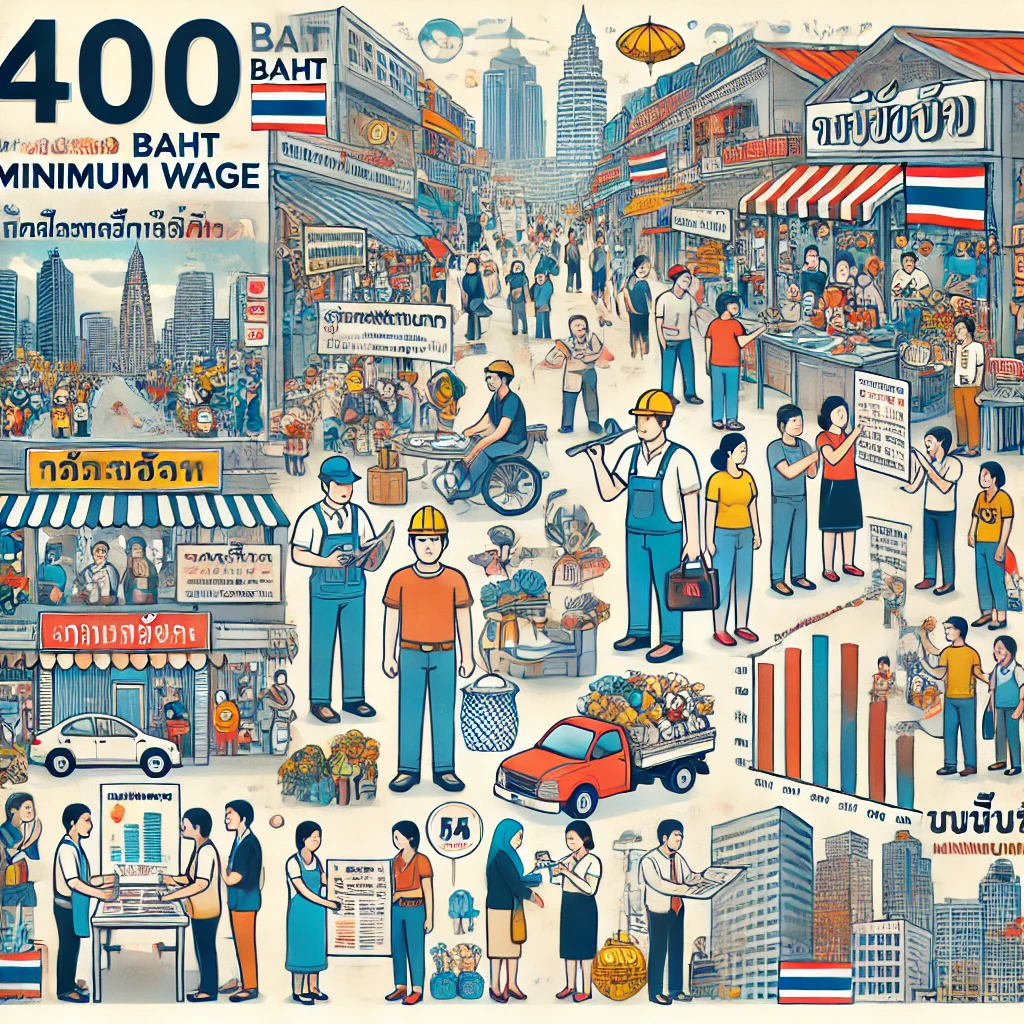Thailand’s Minimum Wage Set to Rise to 400 Baht per Day
In a long-awaited move to improve the standard of living for the country’s workers, the Thai government recently announced that the minimum wage in Thailand will be increased to 400 baht per day, starting in 2025. This change is seen as a significant step to support the workforce and stimulate economic growth. However, while the wage increase has been welcomed by many workers, it has also raised questions about the long-term consequences for the economy and small businesses.
Background and the Decision
The minimum wage in Thailand has been a subject of intense debate for many years, with demands for an increase coming from unions and workers. The government, through Labour Minister Phiphat Ratchakitprakarn, has confirmed that the new minimum wage of 400 baht per day will come into effect in January 2025. This marks a significant increase from the current wage levels, which range from 330 to 350 baht per day depending on the region.
“This is our New Year’s gift to the workers of Thailand,” Phiphat Ratchakitprakarn said during a press conference, explaining that the government’s goal is to provide a fairer living wage that better reflects the rising cost of living in the country. The increase is also seen as a way to improve the purchasing power of the workforce and stimulate the domestic economy.
Criticism and Concerns from Business Owners
While many workers and unions have expressed appreciation for the wage increase, many small business owners and economic analysts are concerned about the potential negative effects. Small and medium-sized businesses, which often struggle with current labor costs, may face even greater challenges when labor wages increase.
“It will be a heavy burden for small businesses. We will have to find ways to manage the costs without having to reduce our workforce or raise prices on our products,” said Surasak Chaiseri, an owner of a small café in Bangkok.
Analysts also warn that a rapid increase in the minimum wage could lead to inflation and affect the competitiveness of Thailand’s export industry. Some commentators argue that the wage increase could drive up the cost of goods and services, which would affect both businesses and consumers.
Support from Unions and Calls for Further Improvements
For the unions, the increase in the minimum wage is a welcome step, but it is far from enough. The country’s largest labor union, the Thai Labour Solidarity Committee (TLSC), has long advocated for a minimum wage of 450 baht per day, citing rising inflation and increasing living costs.
“This is a good step in the right direction, but we demand more. The prices of food, housing, and healthcare are continuously rising. Workers need a higher wage to meet these increases,” said Chalee Lopngam, a spokesperson for TLSC.
The unions argue that the new minimum wage is still insufficient to cover the basic needs of workers, particularly in cities like Bangkok, where the cost of living is much higher than in other parts of the country.
Impact on the Labor Market and Economy
Thailand’s labor market is still characterized by low-wage jobs and informal employment. According to government statistics, over 60% of the country’s workforce is employed in the informal sector, meaning many workers do not have access to social safety nets like health insurance or pensions. The new minimum wage is expected to benefit many of these workers, particularly in sectors like construction, domestic work, and services, where wages have historically been low.
Economic experts predict that the wage increase could have a positive impact on consumer spending, which in turn could stimulate the domestic economy. The increased purchasing power of workers could lead to greater demand for goods and services, benefiting retail and the domestic market.
“This is a step towards improving the welfare of the most vulnerable, and we hope it will contribute to more balanced economic growth,” said economics professor Somchai Pongtornsiri of Thammasat University.
Conclusion and Future Outlook
Thailand is at a crossroads when it comes to labor market reforms. The increase in the minimum wage to 400 baht per day is an important step, but it is only part of a broader discussion on how the country can create a fairer and more sustainable economic future for its citizens. While some see it as a positive sign that the government is listening to the needs of workers, it is clear that much more work remains to be done.
Questions about how these changes will impact small businesses, inflation, and long-term competitiveness in the global market need to be carefully monitored. But for many workers in Thailand, this wage increase represents a glimmer of hope and a first step towards better living conditions in the future.

Fact Box: Thailand’s Minimum Wage Increase to 400 Baht per Day
Effective Date:
- January 2025
Current Minimum Wage:
- Ranges from 330 to 350 baht per day, depending on the region.
New Minimum Wage:
- 400 baht per day (planned increase).
Purpose of the Wage Increase:
- To improve the living standards of workers.
- To increase the purchasing power of the workforce and stimulate the domestic economy.
Expected Impact:
- Improved living conditions for workers in low-income sectors such as construction, domestic work, and services.
- Increased demand for goods and services, potentially boosting retail and the domestic market.
Criticism:
- Small businesses and SMEs (small and medium-sized enterprises) are concerned about higher labor costs.
- Risk of inflation and reduced global competitiveness.
- Employers worry they may need to raise prices or reduce their workforce.
Unions’ Stance:
- Welcome the wage increase but demand further hikes, ideally to 450 baht per day, to meet rising living costs.
- Emphasize that the new wage is still insufficient to cover basic needs, especially in large cities like Bangkok.
Other Relevant Facts:
- Over 60% of Thailand’s workforce is employed in the informal sector, meaning many workers lack social safety nets such as health insurance and pensions.
- Thailand is undergoing extensive labor market reforms to create better and more sustainable working conditions for its citizens.
Long-Term Effects Expected:
- Positive effects on domestic consumption and economic growth.
- Challenges for small businesses, especially in low-margin and labor-intensive industries.
- Increased pressure on politicians to continue labor market and economic reforms to ensure sustainable growth and fair working conditions.
news via inbox
stay informed





